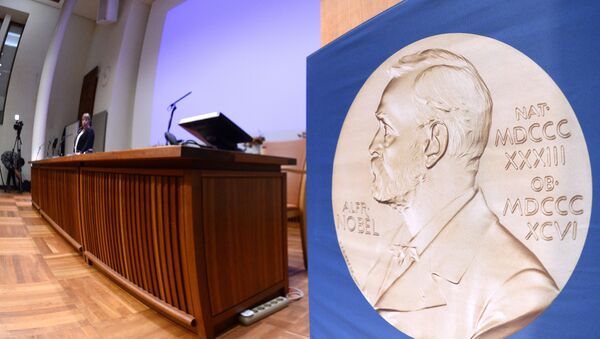William Nordhaus, a professor at Yale University, and Paul Romer of New York University's Stern School of Business were awarded the 2018 Nobel Economics Prize for their ground-breaking work that integrated climate change and technological innovation into macroeconomic analysis, the Royal Swedish Academy of Sciences said on Monday.
READ MORE: Denis Wukwege and Nadia Murad Named Winners of 2018 Nobel Peace Prize
"The Royal Swedish Academy of Sciences has decided to award the Sveriges Riksbank Prize in Economic Sciences in Memory of Alfred Nobel 2018 to William D. Nordhaus and Paul M. Romer," the committee wrote on Twitter.
The decision to award the Nobel prize proves that the climate change influence on the economy continues enhancing, the head of the WWF Climate and Energy Program, Alexey Kokorin, told Sputnik.
"The climate change influences the economy more and more, as many projects face the risk of uncompetitiveness, and many of them are being suspended. Investors often act like robots, as they just invest money depending on the risk category," he said.
According to Kokorin, there is a probability that the necessity to compulsorily limit the volumes of the greenhouse gas emissions will emerge in the future, and the economists are bound to calculate the related risks.
"The forced decrease [of greenhouse gas emissions] will certainly affect the competitiveness of certain companies, as well as the market relations. The coal energy sphere will be subject to the most evident influence. Very many coal projects are currently suspended and are, thus, the most risky ones in terms of investment," the official said.
In addition, European Commission's Vice-President for Energy Union Maros Sefcovic praised the Nobel Committee for acknowledging the importance of the climate change issue.
"Thank you @NobelPrize Committee for recognizing the tremendous importance of innovation in #ClimateAction and congratulations to the winners! Let's hope this inspires more scientists to find new innovative solutions to #ClimateChange in Europe and around the world!" he posted on Twitter.
Last year, the US economist Richard Thaler became the winner of the prestigious award thanks to his "nudge" theory that showed in what way it was possible to influence individuals' decision-making so it would serve their best interest.
The Nobel Prize in Economics was launched in 1968, coming with a monetary award of 9 million Swedish crowns ($1 million). Originally, the Prize in Economic Sciences was not included in the original set of five awards that Alfred Nobel outlined in his 1895 will.




